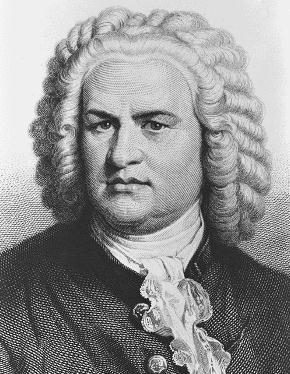~ Southwest Bach Festival will resume the contest in the month of November 2024 ~Please come back periodically to check the updatesDue to the COVID-19 pandemic, the competition was put on hold. With the end of lockdowns, we are now in the process of restarting the competition.The website will be receiving updates to information, rules, and procedure running up to the competition.We hope to see the return of talented young musicians participating in our competition as in previous years.Contest Chair: Eugene Wu at: swbachfestival@gmail.com Click here for: Festival Poster or Brochure for Piano Division downlaods Southwest Bach Festival Committee Aug 24, 2023
|
|---|

Johann Sebastian Bach ( 1685 — 1750 ) Although he is known as one of the world's greatest composers, Johann Sebastian Bach sought no glory or fame. A humble individual who suffered many personal tragedies, Bach never knew the taste of societal success. Born in Eisenach, Thuringia on March 21, 1685, he was the youngest child of Ambrosius Bach, a well reputed violinist and court trumpeter. Bach's family fostered his fascination with music, and his famous uncle, Johann Christoph Bach, encouraged his practice of the organ. Sadly, hygiene was poor in Bach's town of residence, and mortality rates were very high. Bach lost both a sister and a brother. When he was nine years old, Bach's beloved mother, Elizabeth, died, and a few months later his father passed on. Orphaned at a young age, Bach was taken in by his twenty-four-year-old brother, Johann Christoph. Johann Christoph became Bach's mentor, and grudgingly directed Bach's study of the harpsichord. After five years, Bach was able to free himself from his brother's often tyrannical reign. He joined St. Michael's School in Luneburg, where he was able to pursue the study of the violin, organ, and composition. Devoted to bettering his musical composition and playing techniques, he would walk long distances in order to hear performances by noteworthy musicians. At the age of nineteen, Bach took as position a s the organist at the Neukirche in Arnstadt. In 1707, he met and married Maria Barbara Bach, his cousin. Bach was deeply in love with Maria, and she bore him seven children before her death. In 1708, the Duke of Weimar appointed Bach as the organist and director of chamber music. During this time, Bach received a mild amount of the great acclaim that he truly deserved. He became known as an exceptional organist, and his music was well respected. With his focus on the organ, he devoted this period of his life to producing spectacular works for the instrument. Bach faced a jail sentence when he informed the Duke of Weimer that he intended to accept a position from Prince Leopold of Anhalt. Apparently, the duke's ego was bruised when he learned that Bach would rather work for someone else. After the duke had held him as a prisoner for over a month, Bach was given permission to leave Weimar, and to accept the new position. As Kapellmeister and director of chamber music at Cothen, Bach was responsible for leading an orchestra and writing music for its performances. Thus, Bach's focus shifted from writing for the organ to composing pieces for individual instruments and chamber orchestras. Bach's duties included accompanying Prince Leopold, a great appreciator of music, on musical excursions around the country. On returning from one such trip, Bach found that his wife, Maria Barbara, had passed away. As three of his children had already died, Bach faced the prospect of raising his four remaining children alone. Fortunately, Bach was asked to compose and perform cantatas for the prince's birthday. Many singers were hired for the performance of Bach's music, and Anna Magdalena, a twenty-year-old soprano, caught Bach's eye. Merely a year after Maria Barbara had passed away, Bach was remarried to Anna Magdalena. A short week after Bach and Anna married, Prince Leopold took a bride. The prince's bride expressed extreme distaste for music, and diminished the court's emphasis on the arts. Thus, 1722 found Bach relocating once again. Bach vied for the position of music director at Leipzig, and cantor of the Thomasschule there. He sent his Passion According to St. John as evidence of his music writing ability, and was accepted for the post once two other preferred candidates withdrew. Bach retained this position until the close of his life, and busied himself with a variety of responsibilities. As cantor, he taught the school's unruly students Latin, trained singers and instrumentalists, directed musical activities, played the organ, and wrote music for performances. Thus, Bach's life was enveloped in the writing, teaching, and performing of music. He composed a voluminous number of works while carrying out his many duties. Bach's goal was to work hard and to glorify God. He found the strength to meet all the demands that were placed upon him, and to continually produce awe inspiring music. Only after 1726 did Bach acquire a small amount of fame for his compositions. Together, Anna Magdalena and Bach had thirteen children. Given Bach's meager salary and his poor living conditions, life was often difficult. Many of his children passed away simply because their housing was unhygienic. Yet, despite the constant tragedies and challenges he faced, Bach never stopped composing. He experimented with a myriad of musical forms, and produced works that are profoundly lyrical. Toward the end of his life, Bach's eyesight began to diminish. In search of a remedy, he was led to John Taylor, a specialist who also operated on Handel. After two cataract operations, Bach was plagued by a dangerous infection and reduced to a state of near blindness. Nonetheless, with his son-in-law's help, he continued revising and improving his chorale fantasias. Briefly before his death, his eyesight returned. During this time Bach wrote his final piece of music, a hymn appropriately entitled “I Will Appear Before Thy Throne”. Bach's musical works were unaffected by the social trends that altered the course of music during his time. Bach wrote from the heart, and had no desire for public acclaim. Music unceasingly flowed out of his pen, and he is one of the most prodigious writers of all time. Following his death in 1750, Bach's grave was left unmarked and his manuscripts were unceremoniously sold for pennies. It was not until much later that his physical remains were entombed, and his music began to resound across the world. Notes by Shanaira Udwadia (June-2001) |
Music Stores | Galleries & Collectibles | Sound & Visual Island | Sheet Music | Composers | Buying Guide | Articles / Press
Prodigy Solos | Open Solos | Qualified
Solos | Junior Qualified Solo 1 | Junior Qualified Solo 2 | Open
Ensembles | Qualified Ensembles
Prodigy Prize | Open Prize | Qualified Prize | Jr. Qualified 1 Prize | Jr. Qualified 2 | Open Ensemble Prize | Qualified Ensemble Prize
Prodigy Winners List | Open Winners List | Qualified Winners List | Jr Qualified 1 Winners List | Jr Qualified 2 Winners List | Open Ensemble Winners List | Qualified Ensemble Winners List
Video Hightlights 1 | Video Hightlights 2 | Video Hightlights 3 | Video Hightlights 4 | Video Hightlights 5 | Video Hightlights 6 | Video Hightlights 7
Satori Summer Music Festival | Calendar | Visitor's Guide | Master Classes | Recitals / Concerts | Sound Post [News] | Related Links



